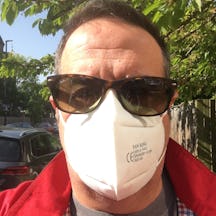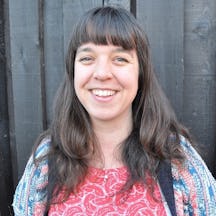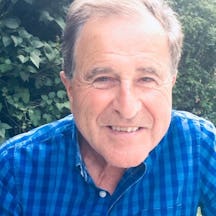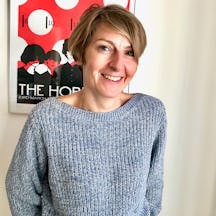Spending lockdown in a small flat with his elderly mum has pushed comedian Mark Thomas to reflect on their sometimes stormy relationship. It’s also made him want to find out more about COVID-19. In the first of six podcasts, Mark calls frontline health workers to chat about coronavirus, end-of-life care and the importance of touch.
The gloves are off
Hosted by Mark Thomassound by Helen Atkinsonproduced by Nicolas Kentproduced by Susan McNicholasphotography by Franklyn Rodgers
- Podcast
- Serial
Listen here
Speaker 1: Hello?
Speaker 2: How have you been? You all right?
Speaker 1: Yep, no problem.
Speaker 3: Oh, hello. Oh my goodness!
Speaker 4: Yeah, of course, that's fine.
Speaker 5: No, that's fine. Hello, yes.
Mark Thomas: Hello. Welcome to ‘Mark Thomas’s lockdown check-up’. I’m Mark Thomas, and this is the first of six podcasts that talks to health and care workers about their lives, work and changes through this first phase of COVID-19. But let me begin by explaining a little bit about my own situation first.
I’m talking to you from a small bedroom; it is about three metres wide by about five metres long. There is room for a bed; there is a brown table with a computer on it. The walls are completely white. It is slightly monastic. This is one of two small bedrooms in a flat in south London, where I am in lockdown with my 85-year-old mother.
For older listeners, I’ve described this situation as like being in an episode of ‘Mrs Steptoe and Son’. For younger listeners, I’m 57 and living with my mum. We have not spent this much concentrated time together since I was six, and unaware of the concept of familial divorce. My mum is fiercely independent, curmudgeonly and contrarian.
Mum: I’m awkward, yeah, I know that. And Ruth says to me, “Play nice, Mum.” And I go, “Okay darling. I’ll try to be good,” because I know that I should.
Mark Thomas: Ruth is my sister, who lives around the corner and is a vicar. And so can testify that my mum has a working vocabulary of profanity that would give the Duke of Edinburgh a run for his money.
Mum: They're fucking stupid.
Mark Thomas: She has a glower that could stop a charging hippo at 50 paces. And a temperament that supports its own microclimate.
Mum: Mark, you are the most aggravating person that is on the planet.
Mark Thomas: That was my mum, and I’m think of putting her quote on a tour poster. My mum’s age puts her in the high risk category. She’s got various conditions, and a prescription list that is handled by Eddie Stobart. So when lockdown began I was scared for what might happen to her. I had a responsibility to her to stop the virus getting into this flat and I was frightened I would fail her. I was frightened of the suffering and pain that that might cause and there was more than a dash of guilt involved. So I wanted to find out as much as I could about COVID-19. How it was spreading, what was happening with it, what was happening to the sufferers, what was going to stop it.
I read research papers, followed the news and watched every daily government briefing. My mum, on the other hand, she wanted to watch ‘Flog It!’ and kept complaining that the news kept repeating the story she’d heard earlier in the day. And it shouldn’t be called the news because there was nothing new on it.
In an effort to try and find out more about COVID-19, I started to phone people that I knew who were working as carers or in the NHS as health workers. This very quickly became a network of people that would take turns chatting to me. And I would speak to people nearly every night. And most of them, I think, I would now actually, very gratefully, describe as friends.
I think talking to them, and the conversations we had about what was happening in their lives and the changes they were facing, very quickly became a essential part of my life under lockdown. And this is how this podcast started.
Speaker 4: Mark, hey. How are you?
Speaker 2: Yeah, yeah, no. I'm waiting for a train, it's fine.
Speaker 5: I'm all right, thank you. Yeah, just everything's a bit overwhelming.
Speaker 3: Yeah, good. A good week.
Speaker 6: I've just had a lovely fight with my knitting and managed to sort out a problem.
Speaker 5: Oh my goodness, I didn’t realise it was that time!
Speaker 1: Like I said, if this is going to help people to understand just how devastating COVID-19 is, then yeah, I’m more than happy.
Mark Thomas: Of all the stories, ideas and emotions to emerge from these conversations, the feeling and absence of touch kept cropping up. And this is where I’ve decided to start this first episode: touch. Skin is the biggest organ in the human body and touch is perhaps the most fundamental sense. The subject seemed to never be far away from a conversation I had with one of my regulars, Anna. Anna is a hospice nurse and this conversation took place on her day off after a particularly tiring series of shifts.
Anna: I see my parents every day, but I can’t give them a hug, I can’t do any of these things they need doing. My dad needs a haircut and I could do that, but I’m not going to because I shouldn’t touch him. I have a theory that everybody sort of nurses by proxy. So when you’re looking after people, you’re looking after people so that someone will look after your people. So I can touch my patients, I can wash them, I can comfort them. I can do things like wipe someone’s tears or help them have a shave, or do mouth care for them. And I think I would feel a lot worse if I wasn’t able to do that. Because I can do that for somebody, I think that gives it a little bit of emotional relief.
Mark Thomas: For me, living through the coronavirus pandemic has meant that the absence of touch, and in fact the fear of touch, I think it’s made me reappraise just how important it is to us. It simply had not occurred to me before, that touch might be crucial to nursing, other than taking a pulse.
Anna: I think it’s completely instinctive to touch, for instance, new babies. Or to touch anybody you think is fragile, and to hold them. I think a really important part of nursing and healthcare and love is just holding people, whether you’re holding their hand or whether you’re actually holding them.
Mark Thomas: It was only after talking with Anna that I started to thinking about my mum's turning circle. She has mobility issues and her turning circle is in reality an eight-point turn. It is accompanied by grinding gears and lots of cabbie swearing. Instinctively, I go to hold her at the elbow when I see her turning. And I hold her, I don't think to provide any specific balance, but what I'm offering is the prospect of a safety net, the potential of balance. And I'm offering that through touch.
My mum interacts with me through touch in a slightly different fashion. One morning I was making coffee, standing in the corner of the kitchen, lurking by the kettle. I hear a noise, I turn around, and I see a five-foot four-inch great-grandmother in her pyjamas and bed socks holding out her walking stick, pointed directly at me. “Bollocks,” she said. “Another couple of seconds and I would have got you.”
This is George, who works with elderly patients in major trauma. His analysis of touch is slightly less stick-wavy.
George: I think it’s an important part of being a doctor, being able to touch people. Not just to examine them, just human contact can make a difference to your consultation and to patient and doctor interactions. One of the best geriatricians I worked for when I was training is a huge man and quite intimidating when you look at him. He’s seven foot or something. But he used to hold everyone’s hand when he was going around and talking to them.
Just the process of having some human contact, you could see … I witnessed what it could do to people. It could make people much more relaxed and express themselves better and tell the doctor really what they were worried about.
Mark Thomas: I love that story: there’s something wonderful about a seven-foot man holding someone’s hand to find out how they’re feeling. And I suppose I like it because it flies in the face of my instinctive reaction, which is if a seven-foot stranger held my hand and said, “How are you feeling?” I’d say, “I’m feeling whatever you want, mate.”
This is my friend Jackie; she is a London-based GP. She talks about care, touch and the diagnostic aspect of it.
Jackie: I’m quite a tactile person in normal times. I get a lot of people coming in with stress, mental health problems, and so on. Without thinking about it, I put my hand on their arm. Sometimes I even hug people – very, very rarely and they usually initiate it. But all of that is completely gone, so there’s a huge loss there because just lightly putting your hand on somebody’s arm, just leaving it there and taking it away again, it communicates so much more than you can ever communicate with words, I think.
I had a young woman in with a breast lump. We always examine any young woman with a breast lump. And I was wearing gloves when I was examining her and I was thinking, “I can’t … Actually, I can’t tell whether she’s got a breast lump if I’ve got my gloves on.” If you think about fine touch through plastic gloves, if you’ve got plastic gloves on, even if they’re the thinnest ones. You should try it yourself, you haven’t got the same fine touch that you’ve got if you’ve just got your fingertips. It’s just not the same.
Mark Thomas: Did you take your gloves off?
Jackie: I did, in the end, yeah. We talked about it and I did. Because actually, this is not safe. She obviously had come in wanting a proper examination, so we talked about it; that was fine. And then I washed my hands. I washed my hands before I put the gloves on anyway, but I washed them and then I washed them afterwards.
Mark Thomas: Were you able to find anything?
Jackie: I didn’t, and it was fine. So it was fine, I couldn’t find anything.
Mark Thomas: One thing I should have explained about my mum is she was a nurse, and if anything happened on your street when I was younger, people used to rush to see her before heading in to A&E or to go to the doctor. One more than one occasion, a bottle of Sanatogen wine and a little thank-you note appeared on our doorstep.
I’ve actually got this rather lovely photograph of my mum in her 20s, in her nurse’s uniform. It’s one of those black-and-white photographs, and she stares into the distance, off to one side, looking sort of optimistic into the future. And she actually looks like one of those worker heroes from a Soviet poster.
Our time together in lockdown has given me a chance to talk to her again about her nursing experiences. I think probably one of my favourite stories is how she learned sign language at school and then used it in the ward with deaf and blind patients. She would take a patient’s hand and spell out the letters with her fingers. Taking one of their hands, she might brush her hand upwards along the open palm: H. Then she might touch the tip of their middle finger with her finger: I. “Hi.” A simple drawing of the letter T on someone’s palm would often elicit the words, “White, two sugars please, love.”
I have a person I talk to quite a lot who is a dementia nurse. I met her three years ago when I was researching a show to celebrate the NHS’s 70th birthday. Her name is Jules, and she was one of the first people that I called. This is what she says.
Jules: I mean, I know from my experiences of nursing in acute that touch is one of the most important forms of communication – actually the most important. You can take someone’s hand who's really distressed, who is looking around the room everywhere, but if you take their hand, they can calm down. Nine times out of ten, someone will calm down. They might not understand the words you say, but they’ll understand your body language and what you’re conveying. If it’s caring, they’ll see that.
You can kneel down, you can look in someone’s eyes, and holding their hand will get them, most of the time, to look at you. For you to have that eye contact, you don’t need words, you don’t need to say words. But I’ve sat with somebody who doesn’t speak English, and just being there to hold their hand, stroke their hand. I think it is difficult if you’re wearing gloves. I would probably take my gloves off, to be honest, that would be my decision to hold someone. Because you want to feel the warmth of someone’s skin in those end-of-life situations.
I think it also goes back to thinking about having that person’s relative there with them, or that main person there with them, and allowing them to do that as well. There are risks, but actually, if you wash your hands, if you take care and really think about what you’re doing, then I think it’s an option that should be there.
Mark Thomas: As I mentioned earlier, one of my other regulars is Anna, who works in a hospice. And she told me this story of one of the loveliest things.
Anna: Most people live in partnerships or marriages or whatever. So many, many people would normally have someone sleeping beside them, or at least lying beside them when they’re in bed. If you’re in a hospice or in hospital, to be in your lonely bed, I think, is a really hard thing. So just being able to lie next to somebody is really important.
At my hospice we have something called a cuddle bed, which looks like a normal hospital bed, but it has special buttons which can make it wider. And beside the normal mattress you can put in two long, thin slots. They’re like slices of mattress, so you can add those at the sides. So it actually makes it to nearly double the width, and that means that the patient can be in the bed and then people who love them can get on the bed with them and hold them.
Mark Thomas: I have to confess, I find the idea of a cuddle bed almost unbearably tender. And I think it’s possibly my favourite object that gets mentioned in this episode.
At this point in the pandemic, one of the things we do know for sure is that isolation, avoiding contact, and washing our hands is the best weapon we have to fight the coronavirus. So in theory, we should be able to beat this thing with logic, knowledge, awareness, and acting upon those three things. But these things aren’t an option for everyone.
One of the people that I speak with is Mike, who is a nurse in a care home for people with dementia. When I first spoke to him I said, “What kind of people do you have in your care home?” And he said, “People that the other care homes kick out.” This is Mike, on the difficulties of working in this particular environment.
Mike: Wear PPE, wash your hands, stay two metres away. You can’t really do that with people with dementia, stay two metres away. I’ve got a man who I care for who, every time he sees me, his face lights up. He’s got this thing for me. I don’t know why, we’ve just got this fantastic relationship, and he wants to hug me. How do you say no? You can’t. He’s not going to understand that I can’t hug him. He can’t; he gets a thrill out of that. He does things with me that he doesn’t do with anybody else. Like I said, I only have to walk in the room and he sees me and his face lights up.
Probably not very professional, but he likes to play-fight with me. He’ll stand there and pretend to box. Or he’ll pretend to do karate, so I’ll mirror the actions back to him. We’re not making any contact, but he loves doing that – he thinks it’s hilarious. Or he’ll chase me. Again, it’s part of our relationship and it’s part of what makes him happy.
Mark Thomas: Like shadow-boxing and games of chase seem to be an instinctive response to a patient. I wanted to know how that spontaneous part of his nursing fitted into the barriered world of COVID-19.
Mike: I’ve got to think about things. There’s only one resident that I’ll hold, that’s it, that one man. The other people I still hold hands with, I wear my rubber gloves to make sure to reduce the contact as much as possible. Our home has been fantastic: we lost, I’d say, probably eight people to COVID, and not one of those people died alone. They all had somebody sat with them, sat next to them, holding their hand. And I’m very proud of all our staff for that. It was such a difficult thing for anyone to do. No one should die alone, ever.
And these poor people were so ill; it was such a horrible way to go. Absolutely burning up, confused, the relentless coughing. One poor gentleman was just coughing up blood constantly as his lungs were starting to pack in with it. It’s horrible. You just can’t get across to people why it’s so important we should be social distancing and wearing masks. If they actually watch somebody die, and it’s not a quick death, it’s a slow death. If you watch them die, then yeah, you might have a bit more appreciation for the PPE.
Mark Thomas: That was Mike, who is a nurse in a care home. One of the things that I started to notice in my conversations was that I was always talking to people when they were just finishing or starting a shift, or it was their day off. And they sounded tired or they were trying to de-stress. And I realised that lockdown has brought in the weird sense of time. We’ve lost our mood calendar for the working week, so I would call people at the most inopportune times. This is Sophie from Liverpool. I managed to catch her as she gets on a train as she’s going home from work.
Sophie: It’s like, it feels like it’s never-ending, I guess now. The first few weeks it was like, “Right, we’re in this. It’s going to finish.” Now I think it’s sunk in that we’re not going to finish and we might be like this for months, and it’s not going to get any better. You still can’t get the families in and it’s awful. It’s awful holding someone’s hand when they’re dying with a glove on and a mask on. I mean, I was really naughty today and I took my glove off, because this guy needed to feel skin. I just felt that he needed a human contact because his loved ones weren’t there. I was one side of him and I was stroking his face and I thought, “That’s ridiculous.” I just felt he needed it and I thought, “What the hell. If I haven’t got it now I’m probably not going to, or I’ve already had it.”
So I just thought I should. I hoped it would bring him comfort because I felt so bad for him. I mean that the plus side, at the end we really, really bonded because no one else is fucking doing it. So you’ve got to rely on each other, you’ve got to give each other hugs. You’ve got to keep each other going.
Mark Thomas: Sophie wasn’t the only person to confess, well, that they had taken their gloves off. This is Anna, who works in the hospice.
Anna: I don’t think most people would consider touching a patient with a bare hand now. We’re, in theory, meant to wear gloves at all times for everything. But I think it’s very dehumanising and I will occasionally take my gloves off and touch somebody’s hand, so they can actually feel my touch.
Mark Thomas: I asked Anna what her manager’s reaction was to her holding a patient’s hand without full PPE and she said ...
Anna: Let's just say that I don't do it front of anybody.
Mark Thomas: The last conversation I'm going to play to you in this episode is with Siobhan. Siobhan is head of nursing at a very big, very well-known hospital. And I started by asking her this: I've wondered, as head of nursing, when you hear that nurses have taken gloves off to hold patients, what your reaction is to that.
Siobhan: Well, what I would say is, a lot of that is for the nurse and for the individual themselves. That’s also a bridge to your own coping mechanism. And I guess we’re in a period where we’re not touching anybody, like touch is the worst thing. We’re not only not touching them, we’re staying two metres away from them. I think when nurses feel that they … I think the circumstance of dying is always, well not always, in most cases, if it’s a tragic situation, it’s a really hard emotional thing. But there’s usually family and friends and loved ones near that person that are participating in that dying process.
And through COVID, when we've been so restricted in having people be involved in care, and trying to protect ourselves, that we don't get COVID, is that, that last bit of human interaction, which is touching someone's hand, or having close physical contact, becomes a big no-no. And actually, clinically, that might be fine. But actually, in the emotional release of somebody dying, that's a really important part of the process, isn't it?
And I would say to nurses, “You can touch somebody’s hand; you need to go wash your hands after and look after yourself.” The nurses were doing that knowing the risk. But I think it’s probably looking after their emotional and psychological wellbeing to have that touch. That relationship in your nursing is that you hold people with you. And the nurses that take their glove off and hold the hand of a dying person: they will know that moment for ever. They will know that person, and that ten minutes and that act they did will stay with them. I think the ease of holding the hand makes it a better memory, isn’t it? That you absolutely did the last, best thing that you could. And that’s quite intrinsic to being a good nurse.
Mark Thomas: Are there, I suppose, guidelines and procedural issues that this throws up?
Siobhan: Oh yeah. Quite clearly, they would be told not to remove their PPE. When you have a breach in protocol and you don’t take your PPE seriously, you’re probably going to get sick and you’re probably going to get COVID. So yeah, from a sensible point of view I always say, “You know what? You can still hold the hand; you don’t need to take your glove off. Keep your glove on, look after yourself. What if that means that you get it and then you’re in the bed in two weeks' time?”
I would try to probably be a bit harder and more pragmatic about it. If I was telling nurses in the ICU, I’d say, “You have to look after yourself first. You’ve got a family at home or you’ve got someone that loves you. Do you want to be in that bed?” You do have to put a bit of hard reality into them. I mean, I wouldn’t go in and say, “Great, anyone that dies today in your care, make sure you’re holding their hand and you take your glove off so you’ve got skin contact.” I probably wouldn’t recommend that professionally.
Mark Thomas: That was Siobhan, who is the head of nursing at a major hospital, and she is our final conversation in this episode. At this point it’s normal for the presenter of a podcast to find some sort of pithy out line, to find the way of bringing together all the themes and strands, and producing some little belch of a soundbite that will summate everything. However, all I want to say is thank you. Thank you to all the health and care workers who took time out of their day off to come and talk to me. I greatly appreciate it.
Mark Thomas: The next episode is on protection. I hope you’ll join us. And the final thing to say is, this morning as I was getting this episode together, I was working at the kitchen table, computer open, working on the laptop, concentrating, headphones on. And I felt the prod of a rubber end of a walking stick on the side of my face. Thanks for listening.
‘Mark Thomas’s lockdown check-up’ was recorded, written and presented by Mark Thomas. The sound editor was Helen Atkinson. The producers were Nicolas Kent and Susan McNicholas. And the podcast was commissioned by Wellcome Collection.
Speaker 1: All the best Mark, take care.
Speaker 2: Thanks for the free therapy.
Speaker 4: Give your mum a hug from me as well.
Speaker 3: Okey doke, take care, bye.
Speaker 5: And you mate, see you soon.
Speaker 6: Really nice to talk to you, and look after your mum.
About the contributors

Mark Thomas
Mark Thomas has been a writer and performer for 35 years.

Helen Atkinson
Helen Atkinson is a sound designer working in theatre and live events. Helen has collaborated with Mark Thomas on a number of live shows including ‘Bravo Figaro!’, ‘Cuckooed’ and ‘Mark Thomas’ Check-Up – Our NHS@70’.

Nicolas Kent
Nicolas Kent was the Director of the Tricycle Theatre in London for 28 years. His political pieces there included: ‘Half the Picture’, ‘The Colour of Justice (The Stephen Lawrence Inquiry)’, ’Nuremberg’, ‘Srebrenica’, ‘Guantanamo’ (nominated for an Olivier award) ‘The Riots’ (2012) and ‘Bloody Sunday’ (Olivier Award for Special Achievement). In 2009, he directed the nine-hour trilogy ‘The Great Game – Afghanistan’ in London, New York and Washington. In 2016 he directed ‘Another World’ at the National Theatre and in 2017 ‘Mark Thomas’ Check-Up – Our NHS@70’. He has also directed productions in the West End, at the RSC, the Royal Court, and on and off-Broadway.

Susan McNicholas
Susan has worked with Mark Thomas for nearly 20 years. She is currently unemployable.

Franklyn Rodgers
Franklyn Rodgers is an artist and creative director whose work explores innovative approaches to re-examining the portrait in contemporary visual culture. His work not only investigates portraiture through narrative, content and context, but also how their placement can open new dialogues in challenging the idea of representation within the language of photography. He has exhibited internationally and his work is held in the permanent collections of the National Portrait Gallery, Tate Britain, Lloyds of London, Welcome Collection, Autograph, Queen Mary University of London and Arts Council England.